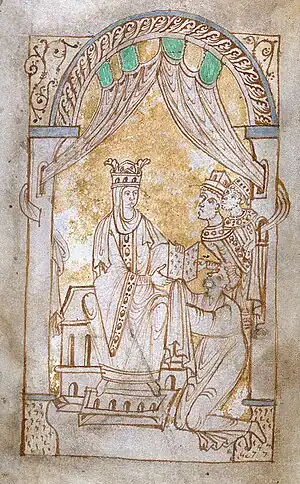1052
Year 1052 (MLII) was a leap year starting on Wednesday (link will display the full calendar) of the Julian calendar.
| Millennium: | 2nd millennium |
|---|---|
| Centuries: | |
| Decades: | |
| Years: |
| 1052 by topic |
|---|
| Leaders |
|
| Birth and death categories |
| Births – Deaths |
| Establishments and disestablishments categories |
| Establishments – Disestablishments |
| Gregorian calendar | 1052 MLII |
| Ab urbe condita | 1805 |
| Armenian calendar | 501 ԹՎ ՇԱ |
| Assyrian calendar | 5802 |
| Balinese saka calendar | 973–974 |
| Bengali calendar | 459 |
| Berber calendar | 2002 |
| English Regnal year | N/A |
| Buddhist calendar | 1596 |
| Burmese calendar | 414 |
| Byzantine calendar | 6560–6561 |
| Chinese calendar | 辛卯年 (Metal Rabbit) 3748 or 3688 — to — 壬辰年 (Water Dragon) 3749 or 3689 |
| Coptic calendar | 768–769 |
| Discordian calendar | 2218 |
| Ethiopian calendar | 1044–1045 |
| Hebrew calendar | 4812–4813 |
| Hindu calendars | |
| - Vikram Samvat | 1108–1109 |
| - Shaka Samvat | 973–974 |
| - Kali Yuga | 4152–4153 |
| Holocene calendar | 11052 |
| Igbo calendar | 52–53 |
| Iranian calendar | 430–431 |
| Islamic calendar | 443–444 |
| Japanese calendar | Eishō 7 (永承7年) |
| Javanese calendar | 955–956 |
| Julian calendar | 1052 MLII |
| Korean calendar | 3385 |
| Minguo calendar | 860 before ROC 民前860年 |
| Nanakshahi calendar | −416 |
| Seleucid era | 1363/1364 AG |
| Thai solar calendar | 1594–1595 |
| Tibetan calendar | 阴金兔年 (female Iron-Rabbit) 1178 or 797 or 25 — to — 阳水龙年 (male Water-Dragon) 1179 or 798 or 26 |

Events
England
- Summer – Godwin, Earl of Wessex, sails with a large fleet up the Thames to London, forcing King Edward the Confessor to reinstate him into his previous position of power.
Africa
- Battle of Haydaran: The Zirid dynasty is defeated by the invading Bedouin Arab tribes of the Banu Hilal.[1]
Religion
- Byōdō-in, a Japanese Buddhist temple (located in the Kyoto Prefecture), changes its name by order of Fujiwara no Yorimichi.
Births
- May 23 – Philip I ("the Amorous"), king of France (d. 1108)
- Agnes of Aquitaine, countess of Savoy (approximate date)
- Conrad II ("the Child"), duke of Bavaria (d. 1055)
- Dirk V, count of Friesland (west of the Vlie) (d. 1091)
- Gleb Svyatoslavich, Kievan prince (approximate date)
- Jón Ögmundsson, Icelandic bishop and saint (d. 1121)
- Robert of Bellême, Norman nobleman (approximate date)
- Roman Svyatoslavich, Kievan prince (approximate date)
Deaths
- March 6 – Emma of Normandy, queen consort of England (twice), Denmark and Norway (b. 984)
- May 6 – Boniface III, Italian prince and margrave (assassinated)
- June 19 – Fan Zhongyan, chancellor of the Song dynasty (b. 989)
- October 4 – Vladimir Yaroslavich, Grand Prince of Kiev (b. 1020)
- October 27 – Qirwash ibn al-Muqallad, Uqaylid emir[2]
- December 14 – Aaron Scotus, Irish abbot and musician
- Amadeus I, count of Savoy (approximate date)
- Guaimar IV of Salerno, Italian nobleman (assassinated)
- Halinard, French archbishop (approximate date)
- Hugh II, count of Ponthieu (also lord of Abbeville)
- Pandulf III of Salerno, Lombard prince (assassinated)
- Pandulf of Capaccio, Lombard nobleman (assassinated)
- Rodulf, Norman missionary bishop and abbot
- Sweyn Godwinson (or Swein), English nobleman
- Xu Daoning, Chinese painter (approximate date)
- Xuedou Chongxian, Chinese Buddhist monk
References
- Gilbert Meynier (2010) L'Algérie cœur du Maghreb classique. De l'ouverture islamo-arabe au repli (658-1518). Paris: La Découverte; p. 53.
- Zetterstéen, K. V. (1927). "Ḳarwās̲h̲". The Encyclopaedia of Islam, Volume II: E–K. Leiden and London: E. J. Brill. pp. 781–782.
This article is issued from Wikipedia. The text is licensed under Creative Commons - Attribution - Sharealike. Additional terms may apply for the media files.